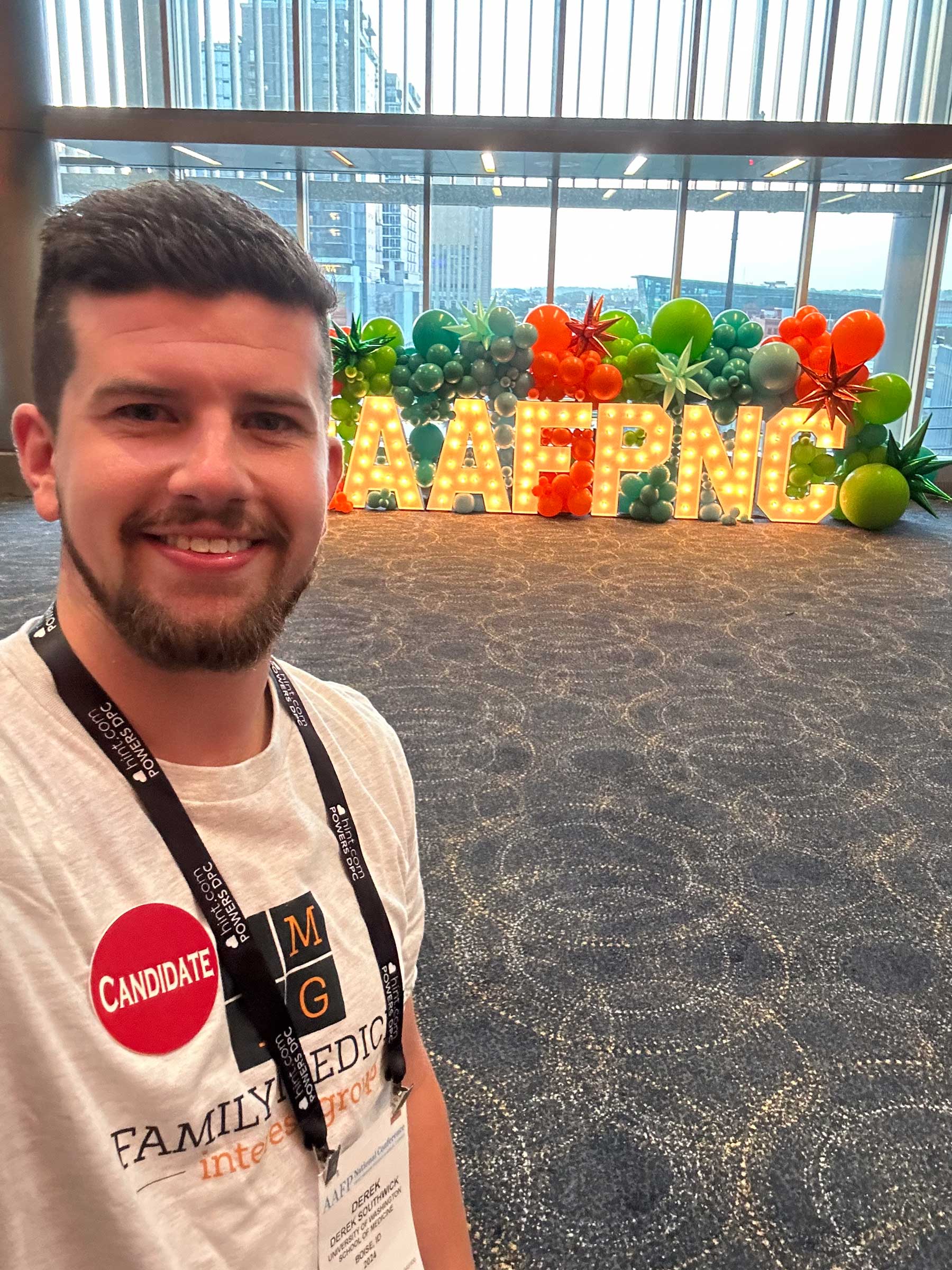MS4 Derek Southwick was recently elected by his peers attending the American Academy of Family Physicians (AAFP) National Conference as a Student Delegate to the Congress of Delegates. “It’s an honor to be the voice for all medical students in the United States,” he said. Here’s some of what he had to say about his recent experience on the student member congress at the recent meeting of the AAFP.
What’s your background with the AAFP National Conference?
I have served as the Idaho Student Delegate to the student member congress for the last three years at the national conference. I am now the senior member of the delegation and spent most my time at and leading up to the conference teaching parliamentary procedure to newly appointed delegates.
Parliamentary procedure refers to the accepted rules, ethics, and customs that govern meetings. This allows for order within the organization. Participation in the student member congress allows for students to learn to run a business meeting using parliamentary procedure, have your voice heard, advocate for a specific action, debate and make informed decisions, and run for elected leadership positions.

Big picture: Why should students care about the AAFP National Conference?
- NETWORKING: One of the best things about the conference is the fact that nearly all family medicine residencies are present at the exhibit hall. It is the best opportunity for medical students to get to know a program.
- Poster presentation: Great opportunity to have your research on display and win awards.
- FMIG activities: Family medicine interest group networking opportunities, scholarships, leadership development, and more.
- Get hyped about family medicine: If you don’t know for sure about family medicine, this conference will help you discover the endless possibility family medicine can provide.
- Get hands on procedural skill practice!
What resolutions were you involved with at the conference?
I drafted a resolution as primary author, “Empowering States to Advocate for Physician-Led Healthcare Teams”. I then used the opportunity to teach other delegates about resolution writing by letting them take the wheel on this resolution as I gave advice on debate strategy. There were 10 other coauthors that were excited to take on this role. The resolution passed.
Can you tell us more about that resolution?
The purpose of the resolution was to ask the AAFP to continue opposing legislation that would expand the practice of non-physician providers. This resolution in part, passed and will go to the AAFP Board of Directors for further action. The phrasing was, “RESOLVED, That the American Academy of Family Physicians will advocate for the expansion of existing rural family medicine residencies, and the creation of new rural family medicine residencies.”
The student congress is very concerned about the recent attempts for “midlevel providers” to gain independent practice authority. The student congress agreed that patient safety is at risk when physicians are completely removed from the healthcare team. We acknowledge the incredible value that each member of the healthcare team brings. We believe that the answer to the physician shortage is to focus on creating more physicians.
What other roles did you have at the conference?
I was appointed Chair of the reference committee this year, which was an amazing experience. The reference committee is formed to provide common understanding of a legislative process. This can simplify and expedite the work of all the delegates when they meet as a conference.
Would you suggest other UWSOM students consider getting involved with the reference committee?
I would highly encourage other students to volunteer time to serve on the reference committee because it’s an opportunity to collaborate with other students across the country, learn about their unique perspectives on issues, and make recommendations about future AAFP policy. I learned a lot from my fellow reference committee members and, on a few occasions, had my opinion changed about a few resolutions which allowed us to give the most appropriate recommendations to the Student Congress.
What does it mean to be elected as a Student Delegate to the AAFP Congress of Delegates?
I have loved representing the voice of Idaho medical students. I have drafted several resolutions that have been passed nationally through the AAFP student congress and locally passed through the Idaho Medical Association’s house of delegates. I’ve learned a lot through my experience and want to continue being a voice and advocating for the future of healthcare.
As student delegate to the AAFP Congress of Delegates, I will represent the voice of all medical students in the Country. Students have a unique perspective on medicine and healthcare. I love that we have a seat at the table in discussing future healthcare policy as we are the future of medicine.
What do you hope to accomplish?
I plan to be an active member of the AAFP congress. I plan to hold caucuses throughout the year for medical students to share their views and perspectives. I will work with other members of the student congress to draft resolutions and plan to bring several resolutions from students to the AAFP Congress of Delegates.
Additionally, I hope to mentor future student delegates to the student congress as they become interested in organized medicine and parliamentary procedure. A goal of mine is to have a student delegate from every state in the union present at next year’s AAFP National Conference to participate in the Student Congress.

